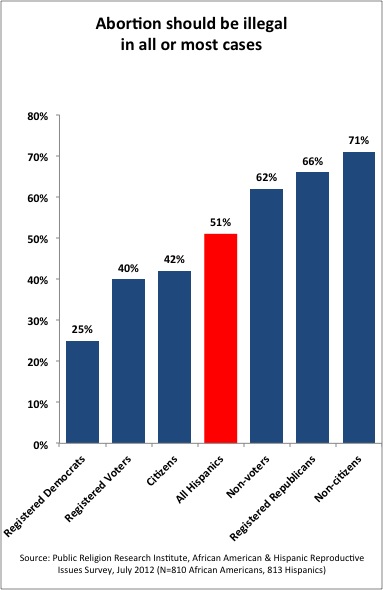 The Romney campaign recently made public its goal of getting 38% of the Hispanic vote this November. Historically, Hispanics have voted for the Democratic presidential candidate by a margin of about 2-to-1, with the well-known exception of George W. Bush, who received between 44% of the Hispanic vote in 2004. This goal will be difficult for Romney to achieve, because the most socially conservative Hispanic voters are, ironically, the voters who are among the least likely to participate in the U.S. political process because of current immigration policies.
The Romney campaign recently made public its goal of getting 38% of the Hispanic vote this November. Historically, Hispanics have voted for the Democratic presidential candidate by a margin of about 2-to-1, with the well-known exception of George W. Bush, who received between 44% of the Hispanic vote in 2004. This goal will be difficult for Romney to achieve, because the most socially conservative Hispanic voters are, ironically, the voters who are among the least likely to participate in the U.S. political process because of current immigration policies.
Earlier this week, I challenged the myth that Hispanic voters are overwhelmingly socially conservative, pointing out that this stereotype remains true for only a subset of Hispanics, self-identified Republicans. Hispanic Democrats, by contrast, are as liberal on abortion and same-sex marriage as Democratic voters overall.
It’s important to note, however, that a significant proportion (47%) of Hispanic adults are not registered voters or are unsure if they are registered. This is because many are non-citizens, and are consequently ineligible to vote. According to PRRI’s African American & Hispanic Reproductive Issues Survey, these Hispanic non-voters are actually more conservative, and thus more in line with the prevailing conventional view of Hispanic Americans. For example, only 33% of Hispanic non-voters believe that abortion should be legal in all or most cases. Therefore, the stereotype of Hispanics as socially conservative has more credence if we look at Hispanic Americans overall.
The only problem is that many of these more socially conservative Hispanics can’t vote for Romney, and many who can likely won’t because of his stand on immigration. Over nine-in-ten Hispanic non-citizens (93%) strongly favor allowing undocumented immigrants who have been in the U.S. for several years to earn legal working status and an opportunity for citizenship in the future, a policy that the Romney-Ryan ticket opposes. Immigration is threshold issue for many Hispanics, particularly non-citizens. Nearly two-thirds (66%) of Hispanic non-citizens and 49% of all Hispanics say immigration is a critical issue. In contrast, only 39% of Hispanic non-citizens consider abortion a critical issue, and even fewer say the same about same-sex marriage (27%).
While the Romney campaign cites the large share of the Hispanic vote received by George W. Bush in 2004 as evidence that a GOP candidate can capture a large segment of the Hispanic population, let’s remember that George W. Bush was governor of Texas and his brother Jeb was governor of Florida, two states with large Hispanic populations. Equally importantly, George W. Bush also supported immigration reform, but his plan was derailed by his own party, then in the majority, in Congress. Ironically, the kind of Hispanics most receptive to a culturally conservative message are the ones been denied entrance to the political system. For the 38% doctrine to work, Romney should first rethink his strategy on immigration.